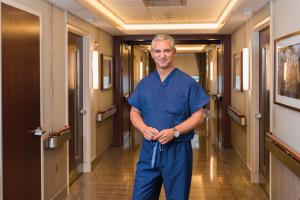NYC Urologist and Prostate Cancer Surgeon, Dr. David Samadi, Shares Vital Knowledge to Support Men Facing Prostate Cancer
Prostate cancer often has no symptoms early on. Starting at 40, regular PSA screenings can catch it early, giving men more control and better chances for a successful treatment.”
NEW YORK CITY, NY, UNITED STATES, January 13, 2025 /EINPresswire.com/ -- Prostate cancer, the second most common cancer among American men, poses a significant health challenge. It's the most common cancer diagnosed in American men with the exception of skin cancer. In 2025 alone, over 35,000 men are expected to lose their lives to this disease. However, early detection and informed decision-making can transform the trajectory of this diagnosis. Dr. David Samadi, a leading prostate cancer expert and author of Prostate Cancer, Now What?, offers critical insights to empower men in their fight against this disease.— Dr. David Samadi
"A prostate cancer diagnosis is life-altering, but it doesn't have to be a death sentence," Dr. Samadi reassures. "Knowledge is power. The more men understand about prostate cancer, the better equipped they are to make informed decisions and advocate for their health. There is hope and a potential for a positive outcome."
Dr. Samadi highlights five key insights that every man should know about prostate cancer:
1. Prostate Cancer Can Be Symptom-Free Early On
"Prostate cancer is often called the 'silent killer' because it's asymptomatic in its early stages," Dr. Samadi explains. "This underscores the importance of regular screenings, including PSA blood tests, starting at age 40. Early detection puts men in control, allowing for prompt treatment and significantly improving outcomes. Be vigilant for later-stage symptoms, including a weak urine stream, blood in the urine, tiredness, bone pain, and unexplained weight loss."
2. Family History Plays a Major Role
Men with close relatives (father or brother) who have had prostate cancer face double the risk, and African American men are disproportionately affected.
"Men who understand this risk and are aware if they have a family history of prostate cancer is crucial and should be discussed with their doctor. It's not just about men's health; it's about safeguarding their future. For those at higher risk, screenings by age 40 are essential," emphasized Dr. Samadi.
3. Emotional and Physical Impact Is Significant
Prostate cancer not only affects the individual diagnosed but also has a significant impact on their family. Understanding and addressing these emotional and psychological challenges is an important part of the journey. Beyond its physical toll, prostate cancer challenges emotional well-being. Anxiety, depression, and concerns about intimacy are common.
"Men often feel isolated, but they don't have to go through this alone," says Dr. Samadi. "Open conversations with healthcare providers and loved ones are key to navigating these challenges."
4. Advances in Treatment Have Improved Outcomes
"Treatment options today are more effective and less invasive than ever," Dr. Samadi shares. Dr. Samadi is renowned for his innovative Samadi-Modified Advanced Robotic Technique (SMART) robotic surgery, focusing on preserving sexual function and urinary continence while minimizing side effects.
"Men should ask detailed questions about side effects of any treatment for their prostate cancer, whether it’s surgery, radiation or hormone therapy. Having a conversation about possible side effects' impact on intimacy and urinary control is essential, and then men can work with their healthcare team to find the best path forward."
5. A Full Life Is Possible Post-Diagnosis
With early detection, the five-year survival rate for localized prostate cancer is nearly 100%.
"The prognosis is promising, especially with early intervention," Dr. Samadi says. "Adopting a healthy lifestyle and staying committed to follow-up care can help men survive and thrive."
Dr. Samadi encourages men to prioritize screenings and remain proactive about their health.
"Prostate cancer doesn't define men," he concludes. "With the right approach, men can beat back this disease to take back control and lead fulfilling lives."
Dr. David Samadi is the Director of Men’s Health and Urologic Oncology at St. Francis Hospital in Long Island. He’s a renowned and highly successful board-certified Urologic Oncologist Expert and Robotic Surgeon in New York City, regarded as one of the leading prostate surgeons in the U.S., with a vast expertise in prostate cancer treatment and Robotic-Assisted Laparoscopic Prostatectomy. Dr. Samadi is a medical contributor to NewsMax TV and is also the author of two books, Prostate Cancer, Now What? A Practical Guide to Diagnosis, Treatment, and Recovery, and The Ultimate MANual, Dr. Samadi’s Guide to Men’s Health and Wellness, available online both on Amazon and Barnes & Noble. Visit Dr. Samadi’s websites at robotic oncology and prostate cancer 911.
David Samadi
Madison Urology
+1 212-365-5000
email us here
Visit us on social media:
Facebook
X
LinkedIn
Instagram
YouTube
Legal Disclaimer:
EIN Presswire provides this news content "as is" without warranty of any kind. We do not accept any responsibility or liability for the accuracy, content, images, videos, licenses, completeness, legality, or reliability of the information contained in this article. If you have any complaints or copyright issues related to this article, kindly contact the author above.



